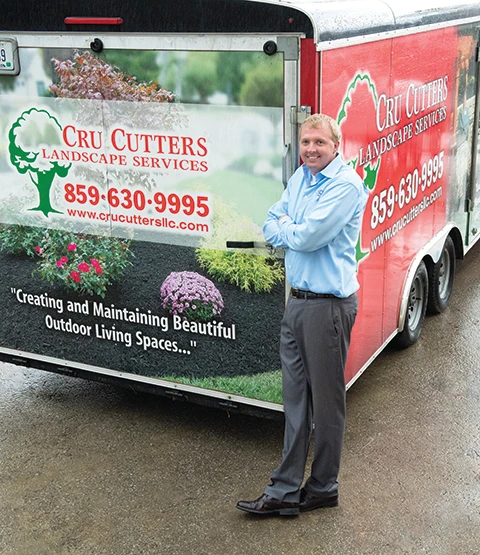
 Chris Cook was only 12 years old when he started mowing lawns around the neighborhood. With the push mower in the back of the family minivan, his mom drove him from one site to the next.
Chris Cook was only 12 years old when he started mowing lawns around the neighborhood. With the push mower in the back of the family minivan, his mom drove him from one site to the next.
Halfway through high school, Cook started driving himself and hiring friends. By the time he graduated in 2005 and officially started Cru Cutters Landscape Services in Florence, Ky., he was already running two mowing crews with six employees. The company quickly grew in both scope and size.
“What we excelled at that gave our company the ability to grow was we took care of our customers, no matter what it took,” says Cook, now 27. “You’re going to have those jobs that don’t go well or don’t necessarily make a lot of money, but the important thing at the end is that the customer’s happy. Putting the customer in front of the dollar amount has gone a long way.”
This principle guided Cru Cutters past several milestones. In 2013, it reached $3.2 million in sales and completed its largest commercial project of nearly $400,000. In spring 2014, it completed an even larger residential project, valued around $450,000. On track to surpass $5 million in 2015, its 10th year, Cru Cutters grows by keeping customers happy.
Diversifying to survive.
After graduation, Cook earned a landscape horticulture degree from Cincinnati State Technical and Community College. The classes opened his eyes to the market opportunity for landscape construction, and in 2007, Cru Cutters began offering construction services spanning hardscapes, patios, retaining walls, pools and plant installation.
 By 2010, landscape construction became Cru Cutter’s main focus, capturing almost 70 percent of sales. One division grew the other, as Cook pursued new maintenance business by cross-selling construction customers.
By 2010, landscape construction became Cru Cutter’s main focus, capturing almost 70 percent of sales. One division grew the other, as Cook pursued new maintenance business by cross-selling construction customers.
“It’s a pretty easy sales pitch at the end of a large construction install: ‘Who better to take care of this new landscape or this patio or pool area that you have than the people who put it in? We know the ins and outs of it. Let us take care of it,’” he says. “We see a very high turnover in commercial and residential construction jobs ending up as maintenance customers for many years down the road.”
To further diversify its services, Cru Cutters also added a lawn and plant care division in 2010 to provide chemical treatments. This became another growth avenue, accounting for about 10 percent of sales. Now with full-service options to meet a variety of customer needs, Cru Cutters’ work consists of 60 percent construction, 25 percent maintenance and the rest snow removal.
“We try to keep a pretty consistent split,” says Cook, noting that the company completed 56 percent commercial work to 44 percent residential last year. “You never know, with the economy, how things are going to turn. The better you can stay diversified and balanced in your portfolio, if something does happen, you can bounce back or adjust.”
Hiring smart.
Early on, Cru Cutters grew new services from scratch. Staff learned specialized skills through industry conferences, vendor-provided training and advice from other LCOs. Cook eased into new services, rolling them out to a few select customers the first season. As the company grows, it gives Cook traction to hire more experienced staff to propel and strengthen each division.
|
Crossing over As Cru Cutters Landscape Services grows, owner Chis Cook is learning how to best allocate staff and resources to meet increasing demand over diverse services. It’s not an exact science – especially in the seasonal climate of Florence, Ky., – which can make planning tricky. The solution to meeting an ebbing seasonal demand is having the flexibility to shift employees from one service to another. “One good thing about having different divisions is we’re able to take maintenance help and move them over to construction and construction guys over to the maintenance side when needed,” Cook says. For example, after a late spring this year, crews started running behind on spring cleanup and mulching work at large HOA complexes. So, Cook pulled the installation crews to assist for a few days. “This allowed us to get caught up when others were still struggling with the late start,” Cook says. “It shows that we can be flexible internally to produce the correct product at the correct time without adding additional overhead or help.” While short-term help and seasonal workers are fairly task-specific in their jobs, full-time employees begin cross-training in multiple areas. Hardscape specialists, for example, will learn simple softscape techniques or perhaps drainage installation. “The longer someone is employed here, the more we expect them to be capable to perform to allow us flexibility,” Cook says. “When operating so many different tasks, this flexibility is important.” |
“I always live by this goal: that if I hire somebody smarter than myself in each particular area of my business, then we should be pretty successful,” Cook says. “To date, that’s what we’ve done. Surrounding myself with those people makes it easy on me to grow.”
Of course, it’s not easy finding those people, so Cook searches several channels to fill positions. While the local community college’s horticulture program supplies a few co-op students each season – some of whom become full-time – he looks deeper into the industry to find more experienced employees.
Specifically, when seeking a certain skill, he reaches out to suppliers. Because they maintain close relationships in the local landscaping industry, they know who’s qualified and looking for new opportunities.
Happy at work.
But if it comes down to choosing between proven skills or personality, Cook hires the latter. A motivated candidate who’s willing to learn from mistakes is more valuable than a candidate who is set in his ways with field experience. Above all, a little enthusiasm goes a long way.
“It’s hard to get excited about hiring somebody that’s just dull,” Cook says. “If the next guy comes in with half the experience but he’s excited to have the opportunity, nine times out of 10 that’s the guy we take. We can train them how to put plants in the ground. We can’t train them how to be enthusiastic.”
Finding these people is only half the battle. In today’s market, holding onto key employees is the challenge. Cook realized this last spring when two long-time operations managers left the company to join a family business in another industry. Though the parting was peaceful, it forced Cook to evaluate the business from his staff’s perspective.
“You spend so much money and time training employees that you really have to put some emphasis on how important of an asset they are,” he says, explaining his push for increased benefit packages and compensation rates. “Tools and trucks can be replaced, but key people are so valuable.”
Cook learned that happy employees are the key to happy customers. If he takes care of his team – 62 employees last spring – they’ll take care of customers and their lawns. This ensures that Cru Cutters doesn’t only grow in numbers, but also satisfaction – with a 97 percent customer retention rate last year.
“We try to become friends with our customers, which is a unique way to look at it,” Cook says.
“We’re very open, we’re big on honesty. We try not to hide anything from them. If you can become a friend, if something then goes wrong, they’re not so quick to jump ship. We don’t always have to be the lowest price because we’re giving them a better value.”
Get curated news on YOUR industry.
Enter your email to receive our newsletters.
Explore the November 2014 Issue
Check out more from this issue and find your next story to read.
Latest from Lawn & Landscape
- Aphix acquires Curb Appeal Landscaping in Birmingham
- Project EverGreen helps revitalize Milan Park in Detroit
- Trex Company wins Product of the Year, Judges’ Choice Winner at Environment+Energy Leader Awards
- General Equipment & Supplies in Fargo adds Takeuchi equipment
- Mariani Premier Group acquires Hazeltine Nurseries
- EnP Investments adds Mark McCarel as Northeast territory sales manager
- Our April issue is now live
- Ready or not






